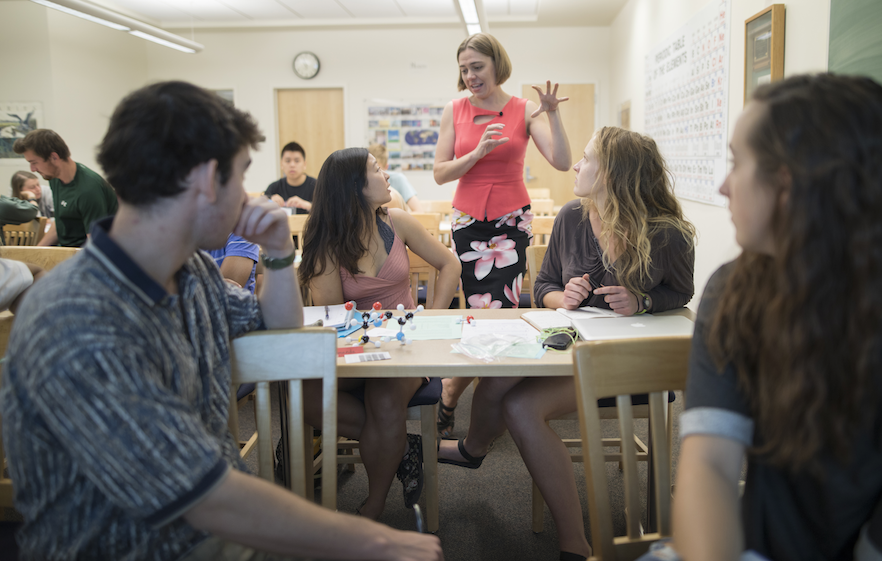NSF grants promote faculty-student research

Four Whitman faculty members received three-year National Science Foundation (NSF) research grants emphasizing the integration of teaching and research: Benjamin H. Brown Professor of Physics Mark Beck, Assistant Professor of Biology Arielle Cooley, Associate Professor of Physics Moira Gresham and Assistant Professor of Physics Greg Vaughn-Ogin.
"This award will allow me to work with Whitman students on characterizing quantum information processors, with the goal of detecting and eliminating errors in these systems," said Beck. "Being able to do this will improve our confidence in the reliability of new quantum-physics-based technologies."
Cooley's research centers on the genetic mechanisms underlying repeated evolution using a model organism.
"I find it really interesting to explore how tiny changes at the molecular level—like a mutation that alters a single one of the three billion DNA letters in a human cell—can sometimes result in dramatic changes in the appearance or function of a living thing," Cooley said. "Instead of working on this question in humans, who are not always the most cooperative of study organisms, I work with a group of plants in the 'monkeyflower' genus Mimulus."
Since 2013, research grants, both from the NSF and elsewhere, have also funded an increasing number of summer research students; 35 science students received funding in 2017. This benefits both faculty members and students, according to Director of Grants and Foundation Relations Rachna Sinnott '93, as summer research students can work on thesis research with their faculty mentors, earn a stipend for work related to their studies and gain experience for graduate school.
Meghan Feldman '18, a physics and astronomy major, conducted research in Beck's lab over the summer and received support from the NSF to travel to Washington, D.C., to present the results at a national conference.
"My research over the summer allowed me to help verify theories that, when implemented, would help make quantum communications more secure," she said. "I chose to become involved because I wanted the chance to conduct research in an area of physics that I find interesting."
Of the other two Whitman faculty members who earned NSF research grants, Gresham will investigate the nature of dark matter, strengthening the understanding of fundamental physical laws and of the evolution of the cosmos; Vaughn-Ogin's award is part of a multi-institutional grant to the Laser Interferometer Gravitational-Wave Observatory (LIGO) Scientific Collaboration Center for Coatings Research and will address the problem of thermal noise in the interferometer mirrors of LIGO's gravitational wave detectors.
Whitman faculty members currently have seven active NSF grants, among many other research grants that include collaborations with major research institutions such as Harvard, Stanford and Yale. NSF is the only federal agency with a mission that includes support for all fields of science and engineering (excepting medical sciences) and is the major funder of basic scientific research in the United States. NSF grants are highly competitive, with an overall funding rate of about 25 percent for all programs; in 2016, there were 37,000 applications.
"Whitman's science programs are among the strongest within the Northwest liberal arts college landscape," said Sinnott. "They really set us apart from our peers. And much of that is due to the availability of facilities, equipment and high-impact research experiences, much of which is enabled by the significant research grants we receive."